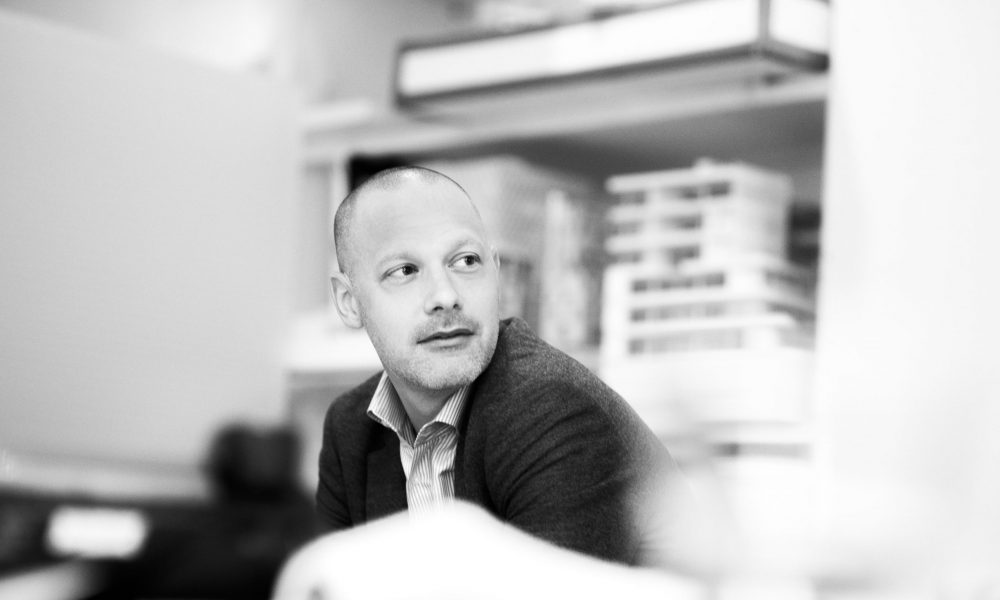

Today we’d like to introduce you to Robert Noblett.
Robert, please share your story with us. How did you get to where you are today?
Behnisch Architekten is an architectural practice that originated in Stuttgart, Germany in 1989. We worked largely in Europe until winning our first major commission in Cambridge, MA in 2003, for the Genzyme Center, which became one of the first LEED Platinum projects of its size in the US. In 2006, we were awarded the commission for Harvard University’s First Science Complex in Allston, which was of a size that we opened an office in Boston, near the corner of Arlington and Boylston Streets. While working on that project we won another major competition for a new law school building at the University of Baltimore, at which point the office began to grow significantly, and we moved into new space on Kingston Street just outside of Chinatown. Since then we have continued to acquire new projects and steadily expand the office. Currently in Boston we are about 30 architects, support staff, and interns, and we constantly rotate personnel around our offices here, in Stuttgart (around 80 people) and Munich (around 30 people).
Overall, has it been relatively smooth? If not, what were some of the struggles along the way?
While we have been exceedingly fortunate in terms of our ability to acquire new and interesting work with ambitious and motivated clients, the road has not always been entirely smooth. In 2009 Harvard University decided to pause construction on a very large laboratory project we were building for them due to the global economic crisis. In terms of built square footage we were about half-way through the project, but most of that area was below ground, and we have very little to show for our efforts. This is always very difficult news for an architect, that a project you have spent considerable effort on will not be realized. Fortunately in this case, Harvard emerged from the economic crisis in 2013 and re-engaged us to go on with the project, albeit with a new building program and form. This project is back in construction today. Another obstacle we encountered was for a project at Amherst College. In 2010, we were selected to design a new science center there, under what was at the time very ambitious and enlightened leadership at the College. The design was controversial in terms of its siting, and in 2012 new leadership emerged and canceled the project just as we were completing the bidding process and beginning construction. This was a devastating setback for the firm, given the time and effort we had expended on the design over a three year period, all of which up to that point had been very favorably received by Amherst. We refocused our efforts on several new projects after that point, several of which are in construction or near completion, but the sting of that loss is still notable.
Alright – so let’s talk business. Tell us about Behnisch Architekten – what should we know?
The history of Behnisch Architekten has been characterized by a highly collaborative working environment that engages clients in sincere and meaningful dialogue about their projects’ aspirations.
Together with our client we employ an approach that is iterative rather than linear. Our work does not have a singular style, yet it is known for its transparency and openness. We create ‘permeable’ spaces that flow from the outside in. We optimize space, light and natural ventilation to give people choices, enhance their productivity and increase their well-being. The result is often a building or structure that becomes, over time, a familiar and symbolic landmark, offering its users a sense of place and identity. Behnisch Architekten is also renowned for being at the forefront of sustainable design. Our projects serve as precedents for integrating both passive and active sustainable strategies in realized architectural ideas.
In 2004, Behnsich completed their first US developer project, the Genzyme Center, in Cambridge, MA, which was the first LEED Platinum office building in the United States. Whatever the task, we see the experiential component of architecture – the composition of space and light – as being free yet supportive of architecture’s social and environmental aspects. Our work is based on a set of strong values but at the same time, we employ a collaborative and situational approach. We show respect for the environment, strive for maximum human comfort, and embrace the art of making space, all while adhering to each project’s budget and schedule.
Any shoutouts? Who else deserves credit in this story – who has played a meaningful role?
As architects it is difficult to overstate the value of enlightened clients, who have a vision for their project and the courage to see that vision through to completion, We have been fortunate to be supported by such clients on nearly all of our projects, individuals who possess the confidence in their ideas and engage with us in a discussion about how these could be realized. We have also created unusually strong bonds with our collaborators – engineers and consultants whom we engage at the very outset of the project, and on whom we rely in the development of truly integrated design solutions. It is because of our extensive experience together that we are able to constantly push for ever-better design solutions.
Finally, we have to acknowledge the rich history of architects and designers who have passed through the office, each contributing uniquely to the project they were involved with, and many of whom have gone on to become highly successful architects in their own right. The history of the office is the collective history of all of the people who have been a part of it, each of whom deserves a measure of credit for its success.
Contact Info:
- Address: Behnisch Architekten
125 Kingston Street,
Boston, Massachusetts 02111 - Website: www.behnisch.com
- Phone: 617.375.9380
- Email: bueroboston@behnisch.com
- Instagram: https://www.instagram.com/behnischarchitekten/
- Facebook: https://www.facebook.com/behnischarchitekten/






[©(c)Roland Halbe; Veroeffentlichung nur gegen Honorar, Urhebervermerk und Beleg / Copyrightpermission required for reproduction, Photocredit: Roland Halbe]
Mark Ostow
Roland Halbe
Janis Rozkalns
Getting in touch: BostonVoyager is built on recommendations from the community; it’s how we uncover hidden gems, so if you know someone who deserves recognition please let us know here.

















